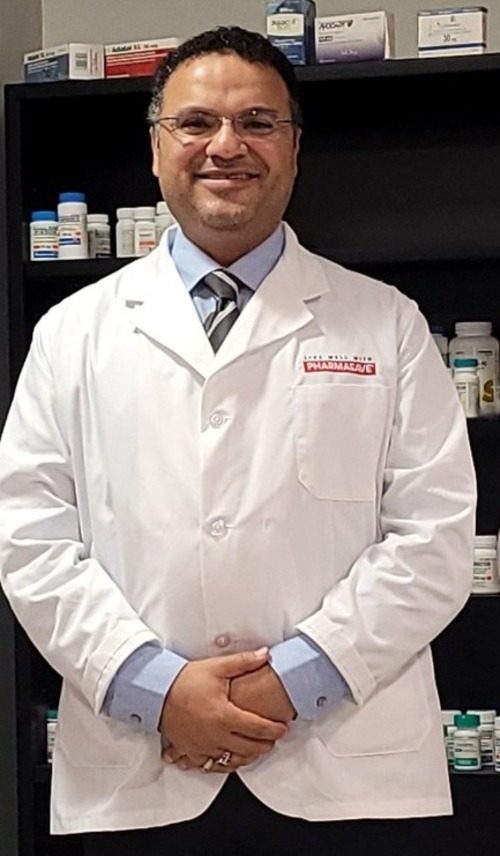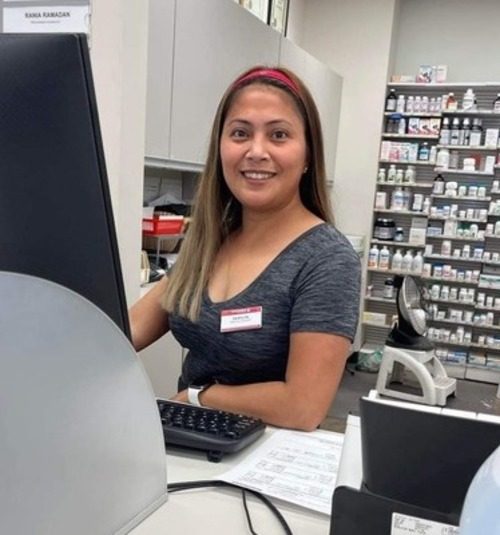Experience the power of Pharmacy this Pharmacy Month. Every year March is celebrated as Pharmacy Appreciation Month and it is the ideal time for people working in the Pharmacy industry to appreciate and promote their profession.
By taking the time to recognize the pharmacy profession during Pharmacy Appreciation Month, we not only acknowledge the hard work and sacrifices of these healthcare professionals but also inspire others to consider a career in pharmacy. Through sharing stories of pharmacy heroes and their life-saving work, we can raise awareness of the critical role that pharmacies play in our healthcare system and encourage support for their continued success.
Let’s hear from a few of our pharmacy heroes…
In Alberta, pharmacy professionals have been leading the way in innovative pharmacy practice. Pharmacists acquired the capability to prescribe medications and give injections in 2007, pharmacy technicians were regulated in 2012, and pharmacy teams are now expanding their focus from simply handling prescriptions and dispensing medications to delivering personalized care.
AlaaeIdin Saleh, Pharmacy Program Coordinator

Let’s hear what ABM College’s Pharmacy Program Coordinator AlaaeIdin Saleh has to say this Pharmacy Appreciation Month.
How has the role of pharmacists evolved over the years to encompass more than just dispensing medications?
The role of pharmacists has undergone a remarkable transformation over the years, soaring to new heights as they adapt to the ever-evolving landscape of healthcare and patient needs. Pharmacists and pharmacy teams have been integral to healthcare, primarily known for procurement, dispensing medications and offering advice on their safe use. However, the scope of their role has expanded especially in the 21st century.
Traditionally, pharmacy as a profession evolved through three distinct phases:
1- Traditional: Preparing and dispensing traditional recipes and folk medicines.
2- Scientific: Began with the transformation into Faculties of Pharmacy, instead of mere apprenticeships. This was characterized by trial and error, research, and careful documentation of statistics.
3- Clinical Pharmacy Role: By the late 1990s, the pharmacist’s role has become more dynamic and patient-centered. They are no longer just procuring and dispensing medicines, but are actively involved in patient care, providing medication therapy management, conducting health and wellness screenings, and administering immunizations.
Can you provide examples of how pharmacy teams go above and beyond to provide person-centered care?
Pharmacy teams, with their unique position within the healthcare system, are of great importance in elevating the standards of care to the personalized level. At the heart of patient-centered services is the deep understanding and recognition that each patient is unique and with an own set of circumstances. Pharmacy teams are expected to take the time to understand the patient’s medical history, lifestyle, and cultural background. This is crucial in creating a unique and individually designed healthcare plan that will align with the specific patient’s needs and lifestyle.
One of the important means to contribute to a uniquely designed and individualized person-centered care plan is through focusing on medication management. They ensure that each patient’s medication regimen is optimized for efficacy while minimizing possible side effects and drug-drug interactions. By conducting regular and thorough medication reviews and reconciliations, pharmacy teams help patients to effectively and safely use their many medications.
What initiatives or programs are in place to support the professional development of pharmacy professionals?
In Canada, the professional development of pharmacy professionals is supported by a variety of initiatives and programs, many of which are facilitated by educational institutions and professional associations. Here’s an overview of some key programs:
Canadian Council on Continuing Education in Pharmacy (CCCEP):
The CCCEP offers competency-mapped accredited programs, including Cannabis and Patient Care, Immunization and Injection, and Compounding program
Leslie Dan Faculty of Pharmacy:
University of Toronto The Continuous Professional Development program at the Leslie Dan Faculty of Pharmacy equips pharmacists and allied professionals with the knowledge and skills to respond to patient needs. They offer accredited courses to expand knowledge in specialized areas of pharmacy practice.
Continuing Pharmacy Professional Development at UBC:
The University of British Columbia’s Continuing Pharmacy Professional Development (CPPD) program is dedicated to providing educational programs in various formats. These programs aim to support pharmacy professionals in achieving their professional goals, whether it’s maintaining competencies for practice in Canada or expanding their knowledge and skills.
Canadian Pharmacists Association (CPhA) Initiatives:
The CPhA provides support for internationally educated pharmacists with mentorship and practical work experience in Canadian pharmacies. They also offer programs like the Pharmacy Workforce Wellness initiative, which aims to address stress and anxiety in the pharmacy profession in general.
University of Alberta Continuing Education and Lifelong Learning: The Faculty of Pharmacy & Pharmaceutical Sciences provides a PharmD program for practicing pharmacists, which includes 18 credits of online coursework and up to 36 weeks of supervised experiential learning. This blend of theoretical and practical education ensures that pharmacists can enhance their competencies while balancing their professional commitments.
Daisylyn Miranda, PHA Valedictorian

She says, I am 42, and a single mom of three(3) children. Before pursuing a career as a pharmacy assistant, I worked as a healthcare aide. The potential for strong career prospects drew me to this program, which has demanding coursework that enhances knowledge, refines critical thinking skills, and overcomes scholastic obstacles. With a lifelong passion for science and an interest in maintaining one’s well-being, choosing to become a pharmacy assistant seemed like a natural fit. Plus, it brings me happiness knowing that I can contribute positively to others’ lives each time they come to work.
During Pharmacy Appreciation Month, I will begin by expressing gratitude to my colleagues. Showing appreciation for their hard work and dedication is one of the simplest yet most significant actions I can take this month. To further celebrate, let’s make time for team-building activities that everyone can enjoy. Schedule group events like an after-work happy hour or pre-work breakfast to foster camaraderie among colleagues. Finally, let’s decorate the pharmacy with a special display to promote Pharmacy Appreciation Month. This will demonstrate our fun side to patients and boost morale among employees.
We asked one of our recent Pharmacy graduates, Lovely Mica Tagata, about her thoughts on the profession and Pharmacy Appreciation Day specifically:
What inspired you to pursue a career in pharmacy?
I have never imagined that I would enjoy my job as a pharmacy assistant. Being a pharmacy assistant is more than just a job, it’s a career with purpose and potential. As a new one in the industry, I became more compassionate and emphatic towards our patients. For me, being friendly and accommodating will make you a better pharmacy assistant because your patients will be more likely to approach you and voice their positive feedback. Given the fact that it is sometimes challenging and tiring, your goal and priority as a Professional Pharmacy Assistant is the welfare of your patients and the people around you.
How do you plan to celebrate Pharmacy Appreciation Month and show appreciation for your fellow pharmacy students and professionals?
I would like to take this opportunity to thank ABM College for having a great staff and instructors. I highly commend Doctor Alaaeldin Saleh, our walking encyclopedia instructor, he is not just an instructor for us, he became our friend and a Dad. Thank you for the knowledge, motivation and life lessons. Thank you for being the key to my success. We are forever grateful, you deserve all the best!
Another pharmacy student, Anabelle Sunar, while expressing her views on Pharmacy Appreciation Month stated, “I’ve always looked up to Pharmacists in my local community as a kid. As a person growing up in the Philippines people relied on Pharmacists for basic medical inquiries more than they do with doctors. To me, the impression of a Pharmacist is like a family member: not as serious as doctors in hospitals, but as respected by people around town. That impression heightened my interest in Pharmacy! I started to read the labels on drug bottles and learned to take medicine at the correct dosage. The curiosity and respect shaped my determination to pursue pharmacy as my future career.”
Sunar concluded by saying, “To celebrate Pharmacy Appreciation Month, I am planning to greet them, give them a small card if possible and express my gratitude for how great they are doing their job. Thank you so much, Doc. Appreciate you from the start to the end of this journey. You are amazing in every way. God bless always!”
Lastly, Debbie Elme, another Pharmacy Student replied, “I wanted to help people and make a difference even if it’s just a small difference in someone’s life. This is the reason behind selecting a pharmacy program. Furthermore, I will celebrate Pharmacy Appreciation Month by letting people know about the contribution that me and my colleagues do, and appreciate everything that has been done so far. pharmacy has come such a long way and will continue to advance.”
Join Pharmacy Diploma at ABM College

Equip yourself with the necessary skills and knowledge to excel in the Pharmacy field. If you want to work in a pharmacy team you need to have a passion for helping others and a strong understanding of pharmaceutical products. You should also have excellent communication skills and be comfortable working with a team. ABM College offers a Pharmacy Assistant Diploma program that covers all of these subjects. The program provides students with the skills and knowledge necessary to pursue a successful career in the pharmacy industry.
In addition, the program provides students with the opportunity to gain hands-on experience in a pharmacy setting. This experience is invaluable in helping to develop the necessary skills to succeed in the industry. Get in touch with our helpful Admissions Advisors to learn more about the program and why it is a high-demand career in Canada.
Follow these Hashtags this Pharmacy Appreciation Month
- #PAM2024
- #PharmacyDoesMore
About The Author

Social Media Specialist & Content Writer, ABM College
Navneet Arora is an experienced social media strategist and SEO-focused content writer specializing in education, career development, and digital marketing. She holds a Master’s Degree in Journalism & Mass Communication and has over 8 years of hands-on experience crafting high-performing content for blogs, websites, and digital platforms.
At ABM College in Calgary, Alberta, Navneet develops engaging, research-driven articles that help students, professionals, and career changers navigate today’s job market. Her work has been published on leading Indian national news portals and recognized for driving measurable traffic growth.
Connect with Navneet on LinkedIn or read more of her work on the ABM College Blog.
